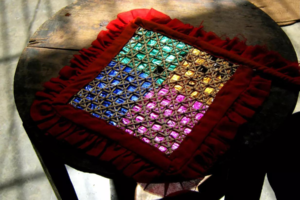Kalpana Lajmi’s Hindi drama movie ‘Rudaali’, produced in 1993, which is based on the novel written by Mahasweta Devi, brought to the fore the lives of professional women mourners in Rajasthan. These women, known as Rudaali, have been traditionally hired to weep at the death of male relatives in the royal families of the state. Later, they also started being invited to mourn deaths in the Rajput landlords’ families in Sirohi, Jodhpur, Barmer, Jaisalmer and other border areas of Rajasthan.
Through its protagonist Sanichari, the famous Indian writer Mahasweta Devi talked about Rudaalis who are always dressed in black and have to sit and cry, beating their chests and the ground, screaming and crying. These women have to continue mourning the death for the next 12 days. It is believed that the more dramatic and theatrical the mourning is, the more it is talked about in the society.
However, due to an increase in literacy, the Rudaali tradition is slowly fading away in Rajasthan. People now prefer quieter funerals, because of which the Rudaalis are now losing their importance. They find it hard to make both the ends meet. Some argue that Rudaalis are already history, and don’t exist anymore. The 1993 movie is more imaginative, less real, they say.
But, Rudaalis still exist in villages like Revdar of Sirohi, Shergarh and Patodi of Jodhpur, Chhittar ka paar, Kotda, Chuli, and Fatehgarh of Barmer, and Ramdevra and Pokharan of Jaisalmer districts of the state. However, their scope of work has now narrowed to a great extent. The reason behind this is that the Rajput landlords don’t yield the same power as they used to in the past.
Also Read: Union Cabinet approves raising the legal age for marriage of women to 21 years
These Rudaalis mostly belong to the Ganju and Dusaad caste, and some even come from Bhil and other communities. All the Rudaalis are widows. They are considered inauspicious and the society looks down upon them as it mostly does to a woman whose husband is no more. In some villages, the Rudaalis have been instructed not to step out of the house early in the morning, as they are still considered unlucky and wretched.
Most of the widow Rudaalis have bowed their head to the judgment of village-council members and have accepted the Naata tradition, in which the woman is married in the same family to the elder or younger brother-in-law (if her husband passes away). Others are still entangled in the vortex of life and keep living with the social stigma of being a widow.
The attire of Rudaalis is decided based on their age. For instance, a young widow has to wear green colour clothes whereas if the widow is in her old age, she has to wear dark red colour long blouse (kurti-kaanchli) with same colour border paired with a skirt (dhaabla) and dark red stole (chunar) that is engraved with black peacock feathers.
It is often said that Rudaalis always live outside the village area. In reality, initially the royal families owned large amounts of land outside the village, where they could shelter the Rudaalis as they were considered inauspicious. In some parts of Sirohi, Jodhpur, Barmer, and Jaisalmer, these women are given shelter in the outskirts of the village. Rudaalis’ first house starts where the last house of the village ends. Their houses are made of thatch and mud.
Also Read: Do sex workers, who often hail from poor rural households, really have a choice?
Even though they are ostracised because they are ‘untouchables’, it does not spare them from exploitation at the hands of the upper-caste men. These widowed women are extremely vulnerable. They can be often seen sitting in groups singing songs and expressing their grief in the form of songs.
As the work of Rudaalis dries up, they are desperate to find other means of survival. To make a living, they undertake daily wage works, farm labour, and animal husbandry. Rudaalis are even called to do illegal activities such as cutting down the restricted trees like Khejri and Rohida in exchange for money.
Apart from nominal wages, some people give these widows leftover food and old clothes. However, there are small changes in the lives of Rudalis due to efforts of a few religious groups. Some Rudaalis earn a lot more through farming and animal husbandry than as professional mourners.
Even if the Rudaali profession becomes extinct, it will not be a big deal. But these women will be left to starve in the absence of any work or a rehabilitation package. They already face a huge problem in getting their daughters married because of their low position and ‘bad image’ in the society. It is not easy to bring changes in the lives of Rudaalis due to a lack of education. But a beginning needs to be made and now.
Author is a senior journalist. Views are personal.

















